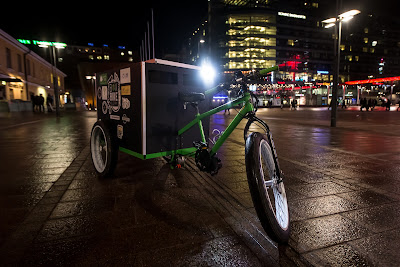 |
| Register of Initiatives in Pedal Powered Logistics - RIPPL #32 The RIPPL blog continues at the website RIPPL.BIKE |
 |
| Photo credit: Fietskoeriers.nl |
Nationwide same day delivery of packages by bike; it sounds impossible. How do they do this? First off, the Netherlands is not a large country, so that works in their favour. However, the short and possibly unsurprising answer is that not all of the journey takes place on bikes. However, the collections and deliveries - the first and last miles, are covered by bike.
 |
| Photo credit: Cycloon |
Fietskoeriers wanted to reduce the ecological footprint of the operation as much as possible. Unfortunately electric vehicles, which emit nothing locally (although of course, depending upon the method of generation, emissions may occur upstream) don’t yet provide the range required for the distances involved. Therefore biogas vehicles, which although still not ideal in terms of environmental impact, do emit significantly less pollutants into the atmosphere than diesel vehicles, are used. Fietskoeriers will continue to review electric vehicle technology and implement it as soon as longer distances are viable. Despite the admittedly minimised emissions that do take place, the difference is felt in the urban realm, where replacing vehicles with bikes brings myriad benefits in terms of air quality and use of public infrastructure and space.
At the Amersfoort hub, packages are sorted and swapped between vehicles before return journeys to the local depots. Back at the depots, packages are loaded onto bikes and delivered to customers.
 |
| Photo credit: Fietskoeriers.nl |
The service is designed to connect retailers and their customers; customers who tend to be at home in the evenings and not in the day. The numbers show that this evening delivery time slot works well for both Fietskoeriers and their customers; with 98% of packages being delivered on the first attempt.
Innovations: first mile collections, last mile deliveries, nationwide same day delivery
Organisation: Fietskoeriers.nl
Sector: Commercial
Country: The Netherlands
Basis: Permanent
Website: www.fietskoeriers.nl
Facebook: www.facebook.com/fietskoeriersNL
Twitter: https://twitter.com/FietskoeriersNL
Contact: info@fietskoeriers.nl
RIPPL is powered by Topsector Logistiek


























